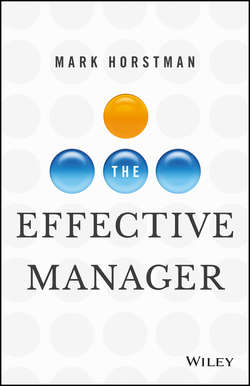The Effective Manager

Реклама. ООО «ЛитРес», ИНН: 7719571260.
Оглавление
Horstman Mark. The Effective Manager
DEDICATION
INTRODUCTION. WHO THIS BOOK IS FOR, WHAT IT'S ABOUT, AND WHY
About Manager Tools
A Note about Data
A Note about Gender
1. WHAT IS AN EFFECTIVE MANAGER?
Your First Responsibility as a Manager Is to Achieve Results
Your Second Responsibility as a Manager Is to Retain Your People
The Definition of an Effective Manager Is One Who Gets Results and Keeps Her People
2. THE FOUR CRITICAL BEHAVIORS
The First Critical Behavior: Get to Know Your People
The Second Critical Behavior: Communicate about Performance
The Third Critical Behavior: Ask for More
The Fourth Critical Behavior: Push Work Down
3. TEACHABLE AND SUSTAINABLE TOOLS
4. KNOW YOUR PEOPLE – ONE ON ONES
Scheduled
Weekly
30-Minute Meeting
With Each of Your Directs
The Manager Takes Notes
Where to Conduct One On Ones
5. COMMON QUESTIONS AND RESISTANCE TO ONE ON ONES
The Most Common Forms of One-On-One Pushback
Talking Too Much and Talking Too Little
Pushback on Note Taking
Can I Do One On Ones over the Phone?
Can I Be Friends with My Directs?
Can I Do One On Ones as a Project Manager?
6. HOW TO START DOING ONE ON ONES
Choose Times from Your Calendar
Send Out a One-On-One E-mail Invitation
Allow for Possible Changes in the Near Future
Review Intent, Ground Rules, and O3 Agenda in Your Staff Meeting
Answer Questions
Conduct One On Ones Only for 12 Weeks
Don't Rush to Get to Feedback!
Don't Rush to Get to Negative Feedback
7. TALK ABOUT PERFORMANCE – FEEDBACK
Encourage Effective Future Behavior
When Should I Give Feedback?
8. COMMON QUESTIONS AND RESISTANCE TO FEEDBACK
How Does It Sound?
The Capstone: Systemic Feedback
9. HOW TO START DELIVERING FEEDBACK
Announce Your Intention in Your Weekly Staff Meeting
Schedule 30 Minutes for Your Briefing
Use Our Materials
Cover the Purpose of Feedback
Walk Them through Each Step of the Feedback Model
Give Only Positive Feedback for Eight Weeks
Add in Negative Feedback after Eight Weeks
Stay as Positive as You Can
10. ASK FOR MORE – COACHING
Step 1: Collaborate to Set a Goal
Step 2: Collaborate to Brainstorm Resources
Step 3: Collaborate to Create a Plan
Step 4: The Direct Acts and Reports on the Plan
11. HOW TO START COACHING
12. PUSH WORK DOWN – DELEGATION
Why Delegation Is the Solution – The Delegation Cascade
How to Delegate – The Manager Tools Delegation Model
13. COMMON QUESTIONS AND RESISTANCE TO DELEGATION
What Should You Delegate?
What If a Direct Repeatedly Says No to Delegation Requests?
14. HOW TO START DELEGATING
AFTERWORD
WILEY END USER LICENSE AGREEMENT
Отрывок из книги
If you're a manager, this book was written for you. If you've ever struggled to lead your team or wondered how to handle a difficult situation, this book is for you. If you find the people side of management (and that's all this book is about) difficult at times, this book is definitely for you.
To be clear: this book isn't about “management” the way most business publications talk about it. To them, “management” means big organizational ideas like strategy, or finance, or organizational change. If you scan the Management section of The Wall Street Journal, you'll see articles about those topics. That's not what this book is about. Frankly, if you're just a frontline manager, or maybe even a director, you don't need to know a lot about that kind of “management” just yet. What you do need to know about is how to manage people. If that's you, this book is for you.
.....
Do you understand? An audience doesn't react to a speaker's nervousness. They react to the behaviors that they see and hear that they ascribe to nerves. If Paul is nervous but doesn't behave as if he is nervous, will his audience notice? Of course not. They'll think he's confident.
Suppose Paul is not nervous, but he engages in all the behaviors that a nervous person engages in. What is the audience going to think? That he's nervous and not confident. At the executive level, that's the kiss of death.
.....